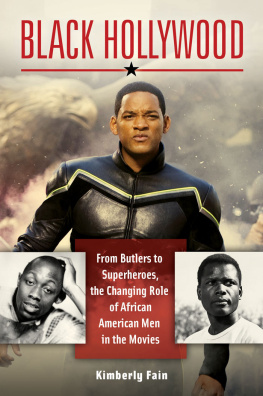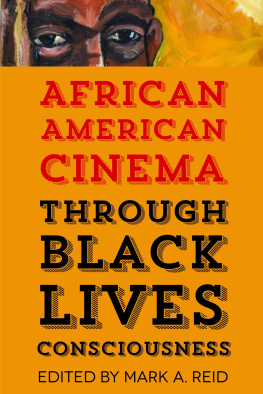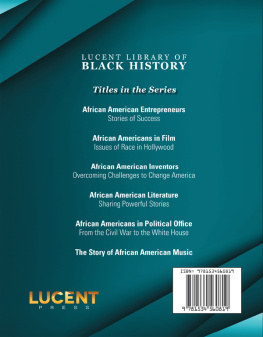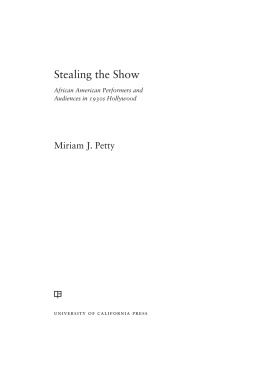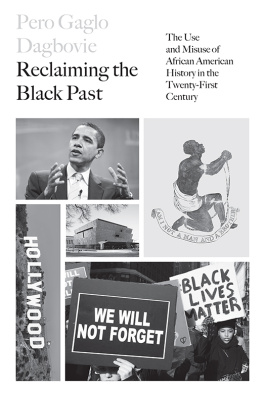BLACK HOLLYWOOD
From Butlers to Superheroes, the
Changing Role of African American Men
in the Movies
KIMBERLY FAIN

Copyright 2015 by Kimberly Fain
All rights reserved. No part of this publication may be reproduced, stored in a retrieval system, or transmitted, in any form or by any means, electronic, mechanical, photocopying, recording, or otherwise, except for the inclusion of brief quotations in a review, without prior permission in writing from the publisher.
Library of Congress Cataloging-in-Publication Data
Fain, Kimberly, 1974
Black Hollywood : from butlers to superheroes, the changing role of African American men in the movies / Kimberly Fain.
pages cm
Includes bibliographical references and index.
ISBN 9781440831904 (hard copy : alk. paper) ISBN 9781440831911 (ebook) 1. African American men in motion pictures. 2. Masculinity in motion pictures. I. Title.
PN1995.9.N4F362015
791.436521108996073dc232015007051
ISBN: 9781440831904
EISBN: 9781440831911
19 18 17 16 151 2 3 4 5
This book is also available on the World Wide Web as an eBook.
Visit www.abc-clio.com for details.
Praeger
An Imprint of ABC-CLIO, LLC
ABC-CLIO, LLC
130 Cremona Drive, P.O. Box 1911
Santa Barbara, California 93116-1911
This book is printed on acid-free paper 
Manufactured in the United States of America
For all of those early twentieth-century African American actors who, during an oppressive era, played stereotypical roles, such as slaves and servants, and their efforts to transform limiting depictions of African Americans, as they kicked in the door for contemporary black males to play action heroes, presidents, God, and superheroes.
We thank you!
Contents
Acknowledgments
F or a book like this, I hoped to include the major players of each decade. However, for any oversights or intended omissions, I still hope to satisfy those popular culture, film history buffs, and those who recognize the contribution of African Americans in the cinema. Nevertheless, I am grateful to various individuals who have supported this project and offered valuable advice on how to improve the book. During this time, watching classic movies, blaxploitation flicks, gangsta rap films, and movies in the Age of Obama, I have noticed both trends and repetitious themes. I appreciate strangers in the coffee shop, supermarket, and movie theaters who gladly offered their opinion on popular culture and black stars in film. But then there are the scholars, researchers, and writers, who greatly contributed to my knowledge of the topic by recommending books and consulting with me at a moments notice.
First, I would like to thank my former students at Texas Southern University and Houston Community College. They caused me to ponder the effect of demonized and idealized depictions of African Americans in film. Even more specifically, they assisted me in questioning the problematic representations of black males in cinema. Their introspection and reflection compelled me to address the trifecta of history, popular culture, and film representations. The aforementioned factors work in a manner that creates a comprehensive portrait in Black Hollywood. Similarly, I appreciate the intellectual growth of students who interpreted all film images as benign. For the purposes of academic and cultural value, I now realize that all entertainment does not have to reside in the realm of high art. Since the beginning of my career in literature, I have incorporated cinematic analysis into every course I have taught.
Next, I would like to thank Dr. Ronald C. Samples and Dr. Charlene Evans, two scholars who graduated from Rice University. Yet they chose to give back to their community by teaching at a predominantly African American university. Although Texas Southern University now proudly represents the diversity of the American culture, it was this historically black institution that forced me to ponder African American contribution to literature, history, popular culture, and the cinema. As my graduate advisers, they guided me on interpreting the motive of the artists, African American representations, and their impact on popular culture. Also, I would like to thank Dr. Michael Sollars. As the editor of World Literary Review: Modernisms Metaphors, Images, and Symbols (Volume 2), Dr. Sollars offered me the position of assistant editor, due to our mutual understanding of the transforming power of media symbols and representations both stateside and globally. Furthermore, I would like to thank my legal family at Thurgood Marshall School of Law. Professor Edieth Wu and Professor Constance Fain are two legal scholars who forced me to think about the power of politics, policy, and law on early efforts of African Americans in history.
Particularly, in terms of the film industry, without Professor Fains guidance, who is also my mother, I would not have realized the necessity of including the Jim Crow era, the Hays Moral Code, the McCarthy era, Hoovers FBI blacklist, and the mythical postracial era in the Age of Obamas Hope and Change. By interweaving the social and historical context of the films, the readers will see how politics and social movements impact cultural representations in film. Lastly, I want to thank Professor Fain for the early readings of essays, articles, chapters, and books. By forcing me to clarify portions of my writings, she taught me to question my own intentions. Thus Black Hollywood attempts to offer an objective slice of popular culture via the movies.
Lest I forget, my former professor Dr. Elizabeth Brown-Guillory was instrumental in beginning my interpretation of immigrant cultures and minority cultures in terms of American identity. During my teaching, researching, and writing fellowships at the University of Houston Honors College, she was our guide as we questioned the cultural representations in literature and theater productions. Since she has produced over 13 plays on southern culture, she is an expert on her subject matter. Without her contributions to playwriting and expertise in African American studies, I would have lacked the foundation to thoroughly analyze early blackface performance onstage and its subsequent influence in film. Despite her promotion to associate provost/associate vice president for academic affairs at Texas Southern University, she has maintained the rapport we built during my two fellowships at the University of Houston. Eventually, her mentorship led to my being awarded a prestigious honorthe Rice University Center for the Study of Women, Gender, and Sexuality Scholarly Award in 2012. With regard to the intersection of race, class, and gender, receiving this recognition has propelled the continuation of my scholarly pursuits of the aforementioned studies.
Also, I would like to thank Rebecca Matheson, editor at Praeger/ABC-CLIO. After I wrote Spike Lee: Rise, Success, and Doin the Right Thing, in Star Power: The Impact of Branded Celebrity, edited by Aaron Barlow, and published by Praeger in 2014, I hoped to write an entire book on Spike Lee. However, she suggested that I write a more comprehensive book including various black actors, writers, directors, and producers. As she guided me through my pitch and proposal, I agreed that there should be a text that covered and extended the territory of Donald Bogle in Bright Boulevard, Bold Dreams: The Story of Black Hollywood (2005), from the 1910s to the 1950s, and Bogles book entitled Toms, Coons, Mulattoes, Mammies, & Bucks
Next page
